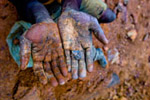
A growing network of activists is flexing its market muscle to help end the crisis in the Democratic Republic of the Congo, the deadliest and most neglected war in the world. That country’s conflict minerals continue to play a central role in financing some of the worst human rights abuses in the world, including an epidemic of sexual violence perpetrated by fighters on all sides of the war.
These same minerals—tin, tantalum, tungsten and gold—are essential to our cell phones, computers, and other high-tech gadgets. Emerging activism in the United States and Europe is recognizing that this link between our gadgets and Congo’s conflict provides an opportunity to be part of a solution. Such efforts are helping to galvanize reform efforts within Congo, drive reform among companies within the international supply chain for the minerals, and spark new leadership from the Obama administration following Secretary of State Hillary Clinton’s visit to eastern Congo.
Here’s a quick rundown of the latest developments on conflict minerals:
In Congo: Crisis and Opportunity
Military operations in eastern Congo continue to target mineral rich areas. Although the FDLR rebel group has been forced out of some of the lucrative mines that had sustained their insurgency, they continue to profit from the trade elsewhere. And in many cases, the Congolese military has assumed control of mines, employing the same tactics as the FDLR to intimidate and exploit miners and their families. The August 12 attack on the largest mine in North Kivu, which killed 16 people and wounded 45, demonstrates this deadly volatility.
In a positive move, the Congolese government has signaled its determination to bring the mining sector under state control and remove the military from the mines. Together with the United Nations, the government has prioritized preventing the illegal and illicit trade in minerals and other natural resources a priority component of its plan to stabilize eastern Congo. Under pressure from international activists and UN investigations, Congo’s minerals traders have expressed a willingness to change how they operate and to cooperate with international efforts to improve the traceability and transparency of the supply chain.
The International Supply Chain: Under Pressure
Metals traders, refiners, and smelters are feeling increasing pressure from their customers. Most recently tin smelter Thaisarco announced it would suspend purchasing minerals from Congo. This is regrettable, as it could wind up punishing those miners who earn a meager living from the trade. Moreover, Thaisarco had been leading the development of an industry initiative to improve due diligence in supply chain for Congolese minerals. Governments, NGOs, and international organizations should support this initiative and ensure that it will be credible and independently verifiable.
The Electronics Industry: Assuming Responsibility
Industry heavyweights are beginning to take a more proactive approach to conflict minerals, with HP, Dell, Intel, and Motorola hosting a multi-industry forum to help develop transparency, accountability and assurance mechanisms in the supply chain of extracted metals. These companies should lead efforts to trace, audit, and certify their supply chains, while at the same time supporting efforts to reform the trade in Congo and improve the livelihoods of communities dependent on Congo’s minerals.
The Obama Administration: New Leadership
During her visit to eastern Congo, Secretary of State Hilary Clinton took a strong stance on conflict minerals: “[T]he international community must start looking at steps we can take to try to prevent the mineral wealth from the DRC ending up in the hands of those who fund the violence here.” Senior officials in the State Department have been tasked with developing pragmatic policies to put Secretary Clinton’s words into action. The administration can do this by applying U.S. expertise on mining reform and corporate responsibility to the crisis in Congo, developing programs to support reform, and directly assisting miners.
On Capitol Hill: Legislative Momentum
In Congress, legislative efforts to put the burden of proof on companies to disclose where they are sourcing their minerals are moving forward. The bi-partisan Congo Conflict Minerals Act, Senate Bill 891 introduced by Senators Brownback (R-KS), Durbin (D-IL), and Feingold (D-WI), is a step in the right direction. Companion legislation in the House is expected to be introduced soon.
Activism: Just Getting Started
Sustaining all of this momentum will require a genuine consumer movement to step up and demand a change. As consumers, we should continue to let electronics companies know that we want them to ensure their products do not finance war. As citizens, we should encourage our representatives to pass legislation that will demand transparency from multinational companies and help contribute to reform efforts on the ground. Together, we just might be able to help put Congo’s minerals to use for the benefit of its people. Visit RAISE Hope for Congo to find out how to join the movement.
Photo: Mineral residue on the hands of a miner in eastern Congo (Mark Craemer)

